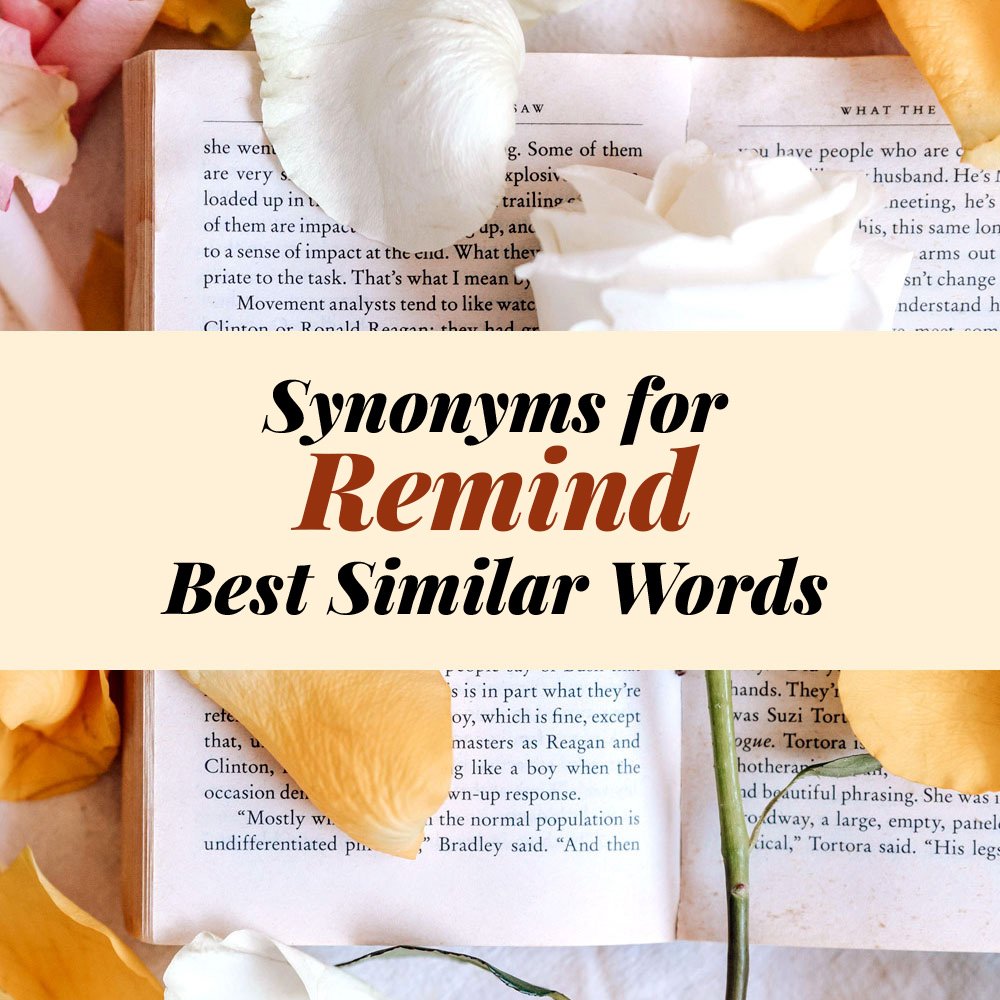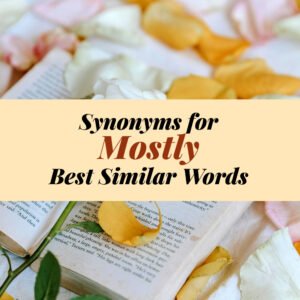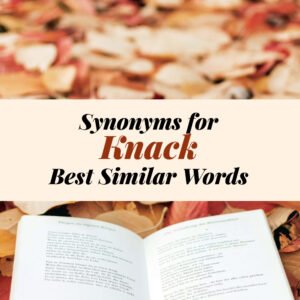When you want to bring something to someone’s attention, using the word remind is common. But there are many other ways to express the same idea. Words like prompt, alert, notify, and recall can make your sentences more interesting. In this article, we will explore 22 different synonyms for remind with examples to help you use them easily.
| Synonym | Example |
|---|---|
| Prompt | She prompted him to finish his homework before dinner. |
| Remind | Please remind me to call my friend tonight. |
| Alert | The teacher alerted the students about the test schedule. |
| Notify | I will notify you when the package arrives. |
| Recall | I can recall the exact words she said yesterday. |
| Encourage | He encouraged her to keep trying despite failures. |
| Suggest | I suggest you check your email regularly for updates. |
| Advise | The doctor advised him to take his medicine on time. |
| Mention | She mentioned the meeting during lunch. |
| Bring to mind | That song brings to mind my childhood memories. |
| Call attention | He called attention to the missing documents. |
| Cue | The director cued the actor to start the scene. |
| Signal | The bell signaled the end of the class. |
| Alert to | She was alerted to the danger by the loud alarm. |
| Inform | I informed my team about the new project rules. |
| Inspire | His speech inspired me to work harder. |
| Hark back | The old photograph harked back to happy moments. |
| Point out | She pointed out the mistakes in the report. |
| Recommend | I recommend you read this book. |
| Call to mind | That smell calls to mind the holidays at my grandparents’ house. |
| Remind of | This picture reminds me of our trip to Italy. |
22 Different Ways to Say REMIND: Another Word for Remind
Prompt
Prompt is a useful word when you want someone to act or remember something quickly. It is polite and encourages action without pressure. You can use prompt at work, school, or home to help others not forget tasks. It works well in situations where timing is important. This word is gentle but effective.
- She prompted him to complete the assignment.
- The coach prompted the player to stay focused.
- Can you prompt me to call mom later?
- The alarm prompted me to wake up early.
Alert
Alert is perfect for bringing attention to something important or urgent. It is commonly used for safety, warnings, or important updates. Alert ensures that someone notices and responds quickly. It is suitable for schools, offices, or emergencies. This word communicates urgency and keeps people aware of important matters.
- The teacher alerted the class about the fire drill.
- I was alerted to the error in my report.
- The system alerts you if there is a problem.
- He alerted his friend about the traffic jam.
Notify
Notify is great for formally informing someone about an event, task, or change. It is widely used in work or official contexts. Using notify ensures that people receive the information clearly. It is direct, polite, and reliable. This word is helpful when you need to communicate reminders in writing or messages.
- I will notify you when the package arrives.
- The manager notified the team about the meeting.
- You need to notify the office if you are late.
- They notified us about the schedule change.
Recall
Recall is ideal for bringing something back from memory. It is often used to remember past events or details. Recall works when discussing experiences, lessons, or memories. It reminds someone of something they may have forgotten. It is also useful for storytelling or reflection.
- I recall the day we first met.
- Can you recall where you put your keys?
- She recalls the story her grandmother told her.
- He recalled the important points from the meeting.
Encourage
Encourage is used when you want to motivate or gently remind someone to act. It inspires action while being supportive. Encourage is suitable for teachers, friends, or leaders. It helps others stay focused and positive. This word is helpful for reminders with a kind tone.
- He encouraged her to try again.
- Teachers encourage students to participate.
- I encourage you to finish your project.
- She encouraged her friend to stay healthy.
Suggest
Suggest works when giving a gentle reminder or advice. It is polite and not forceful. You can use suggest for hints, tips, or recommendations. This word is useful in professional or casual conversations. Suggest helps someone remember without making them feel pressured.
- I suggest you check your messages daily.
- Can I suggest taking a break?
- She suggested we start early.
- The guide suggested following the instructions carefully.
Advise
Advise is perfect when giving important guidance or instructions. It is formal and communicates authority. You can use advise for work, school, or professional reminders. This word helps someone take action correctly and on time. It works well for both spoken and written reminders.
- The doctor advised him to rest more.
- I advise you to read the instructions first.
- She advised me to save money regularly.
- They advised checking the weather before traveling.
Mention
Mention is great for bringing up a point briefly. It is casual and often used in conversations. You can mention a fact or task as a soft reminder. This word works for social, school, or workplace discussions. Mention is gentle and non-intrusive.
- She mentioned the meeting yesterday.
- He mentioned your idea to the team.
- I forgot to mention the new schedule.
- Can you mention the rules to everyone?
Bring to mind
Bring to mind is used to remind someone of memories or experiences. It is often emotional and descriptive. This phrase works well in storytelling, sharing feelings, or reflecting on past events. Bring to mind makes a reminder more meaningful.
- That song brings to mind my childhood.
- This smell brings to mind fresh cookies.
- The photo brings to mind happy memories.
- His words bring to mind old lessons.
Call attention
Call attention is useful for highlighting something important. It makes people notice what needs focus. Call attention is helpful in work, presentations, or classroom settings. It ensures key points are remembered. This phrase works well for serious reminders.
- He called attention to the missing files.
- The guide called attention to the rules.
- Please call attention to the changes in the schedule.
- The teacher called attention to the mistakes.
Cue
Cue reminds someone to act at the right moment. It is often used in performances, meetings, or tasks requiring timing. Cue ensures coordination and readiness. This word is effective when timing matters and people need a gentle nudge.
- The director cued the actor.
- Can you cue me before the speech?
- The bell cued the end of the class.
- She cued him to start the presentation.
Signal
Signal uses signs, sounds, or gestures to remind someone. It is often indirect but clear. Signal works for alarms, alerts, or gestures in work or home settings. This word communicates effectively without words.
- The bell signaled the end of class.
- She signaled me to stop.
- Traffic lights signal drivers to move.
- The flag signaled the start of the race.
Alert to
Alert to notifies someone of danger or changes. It highlights attention and safety. Alert to is useful for urgent reminders or warnings. This phrase ensures people respond quickly to important situations.
- She was alerted to the danger.
- The system alerted me to the problem.
- They were alerted to the sudden change.
- He was alerted to suspicious activity.
Inform
Inform is for formally giving facts or updates. It works well in professional or official settings. Inform ensures someone receives and understands important details. This word is direct and polite.
- I informed my team about the rules.
- Please inform me of any changes.
- The teacher informed students about the exam.
- He informed his manager about the delay.
Inspire
Inspire motivates someone while reminding them. It encourages action positively. Inspire is ideal for mentors, friends, or leaders. This word creates energy and motivation alongside a reminder.
- His speech inspired me to work harder.
- She inspired her team to succeed.
- The book inspired him to write.
- He inspired his friends with his story.
Hark back
Hark back recalls something from the past. It often creates nostalgia or reflection. This phrase works well in storytelling, photos, or memories. Hark back reminds in a thoughtful, reflective way.
- The photo harked back to childhood.
- The song harks back to old days.
- That story harks back to my school life.
- The painting harks back to the old town.
Point out
Point out highlights important details or errors. It is clear and practical. Point out is useful in work, school, or reviews. This word ensures someone notices what matters.
- She pointed out the errors.
- I pointed out the important points.
- He pointed out the problem.
- The teacher pointed out the missing answers.
Recommend
Recommend is polite advice for action or decision. It reminds gently with guidance. Recommend works in personal, school, or work contexts. This word helps someone take proper steps or make choices.
- I recommend reading this book.
- The doctor recommended resting more.
- She recommended taking notes.
- They recommended joining the group.
Call to mind
Call to mind evokes memories or ideas. It reminds someone of something specific. Call to mind is descriptive and works for stories, smells, or events. This phrase makes reminders vivid.
- The smell calls to mind holidays.
- This picture calls to mind my trip.
- That song calls to mind old friends.
- The story calls to mind happy moments.
Remind of
Remind of is direct and compares present experiences to past ones. It works in daily conversation. Remind of connects memories and present experiences. This phrase helps someone remember people, places, or events.
- This picture reminds me of Italy.
- The smell reminds me of cookies.
- He reminds me of my brother.
- That movie reminds me of childhood.

Final Thoughts
Using 22 different words for remind makes communication more engaging and effective. Selecting the right synonym adds clarity, tone, and style. Words like prompt, alert, or bring to mind make reminders memorable, gentle, or motivating depending on the situation.









